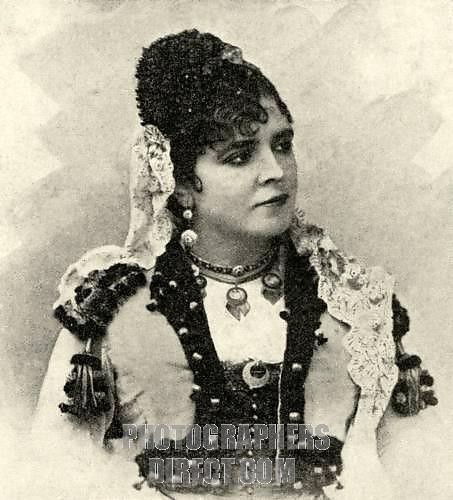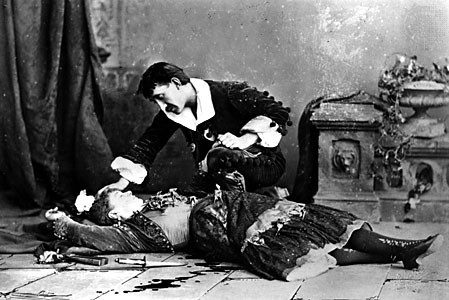A Bold, Erotic Carmen at the Metropolitan Opera Live in HD January 16
Elina Garanca and Roberto Alagna Face Off Brilliantly
By: Susan Hall - Jan 13, 2010
Carmen
The Metropolitan Opera
Conducted by Yannick Neret-Seguin
Featuring: Elina Garanca, Barbara Frittoli, Roberto Alagna, Mariusz Kwiecien, Keith Miller
Live in HD, Saturday, January 16
The Metropolitan Opera mounted its dress rehearsal for the Saturday broadcast of Carmen on Tuesday evening. The broad, red, top-to-bottom slash across a black curtain signified not only red hot lighting, but a vaginal abstraction which is further revealed as the curtain rises on the cragged outlines of the Seville cityscape. The images are not quite vagina dentata, although it would have behooved Don Jose to be more fearful of Carmen.
Carmen is a story in which love and eroticism are confused. Carmen for the briefest moment in the quintet at the end of the second Act, sings "Je suis amoureuse," as though she meant it. Clearly Don Jose is consumed by desire and rejects the love of Micaela and his mother. Carmen flaunts her sex, sometimes pawing and prancing like a racehorse at the gate, often with legs splayed ready for action. Men find her irresistible, but only Don Jose is consumed.
Based on a best-selling novel by Prosper Merimee, Bizet chose this story to fill a request from the Opera Comique to write a three act opera. The brilliant librettists Henri Meilhac and Ludovic Halevy were engaged. All three understood the needs of translating fiction to the stage and brought forward foils for Carmen and Don Jose in the characters of Micaela, the good girl, and Escarrillo, a toreador whose confrontations with death in the bullring have stripped him of any jealousy.
This production's Carmen is hot and juicy. An actress of the first order, Elina Garanca sings beautifully, if sometimes more like a Rossini soprano than a Carmen. She's not quite Emma Calve's heir, -- yet. Surely she has a calm, easy assurance and the calculated, dominating power attributed to Galli-Marie, the first Carmen, who Bizet himself chose. Fortunately Garanca has not suffered a knife-wound like Galli-Marie who was attacked by an overzealous Don Jose in Genoa.
Adjectives like dangerous, impudent, coquettish, sparkling, insouciant and piquant have been attached to the list of premier divas who have undertaken the role. That they can all be seen in Garanca tells you how entrancing her performance is. Over time, her voice may become heavier and more dusky, fulfilling her early promise.
Alagna, for all of his passion, is a devil, and even in a deeply-felt scene with Barbara Fritolli as Micaela, in the first act, he had her laughing and giggling. I'm sure he will be reined in for the HD broadcast. It was fortunate that Carmen has no lines to sing when Alagna smothers her mouth with kisses which appeared to be enthusiastically bestowed as he groped and hugged her. Of course, Carmen asks for it.
As Alagna warmed, his voice opened up. His aria "Le fleur que tu m'avais jeter," was a heartbreaker. He makes a splendid Don Jose.
The opera opens with a pas de deux choreographed by Christopher Wheeldon. The performances by Maria Kowroski and Martin Harvey immeasurably enhance the production.
Frankly, I was concerned when the production was called "dark." Director Richard Eyre made Notes on a Scandal which I saw in a cut six months before its release. The film was not only dark, it was ugly. Lead actress Judi Dench left that screening pale and disturbed.
Eyre's Carmen is neither dark nor ugly. It is as intense and exciting as the composer and librettists intended. I am astounded by the myriad of details -- the children's chorus, the marching troops, the smuggler's cave, and Frasquita and Mercedes who sounded like the Rhine maidens -- all are built in to portray outsiders and insiders living cheek by jowl in any society. Eyre has moved the time to Franco's Spain, and this gives a fresh view.
All of the composer's elements are on display both in the orchestra conducted convincingly by Maestro Nezet-Seguin and also on stage. We experience Mediterranean-spiced melody and vibrant spontaneity, lush rhythms and harmonies, sly purring smiles and castanets of the whirling Gypsy dancing girls. There is the noisy bustle of the sun-drenched streets of Seville, the fateful warning of the fortune tellers cards and a gaudy procession for the bullfighter.
It is unfair to group the production elements together for praise, but they are uniformly enticing. General Manager Gelb was not able to include his signature white nightgown with deep décolletage and straps falling from the shoulders. Carmen's fourth act black lace gown, however, was a splendid substitute. Wreathed in a tall mantilla, lace falls bit by bit until Carmen stands like John Singer Sargent's Madam X, straps falling from her shoulders. After she tumbles to the floor, Carmen has what CBS would call a wardrobe malfunction. If it happened to Janet Jackson. Exciting.
Stories of the French reaction to the opera's premier abound. An early stumbling block was director de Leuven's hostility to the libretto. "We have five or six boxes a night for marriage interviews. Impossible." Poet and critic Theophile Gautier wrote that he preferred silence to music after he attended a performance.
A day before he died, Bizet had signed a contract for Carmen's production in Vienna. Brahms and Wagner were in attendance and praised the opera highly. The popularity of Carmen dates from this performance in which spoken words were replaced with recitatives. Tchaikovsky predicted correctly that Carmen would be one of the world's best loved operas. It deserves to be. And the Met's is a production the opera deserves.






